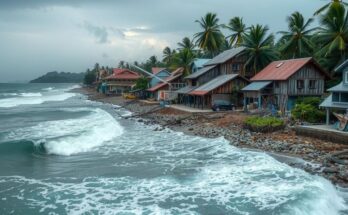Ecuador faces its worst drought in 60 years, exacerbating wildfires and threatening biodiversity. Factors include climate change, human activity, and poor management by local governments. The country is experiencing economic losses due to electricity cuts as 70% of energy is hydropowered. Local voices call for accountability and systemic change to address these intertwined issues.
Latin America, renowned for its diverse ecosystems and vibrant cultures, is facing a significant environmental crisis, particularly in Ecuador, which is experiencing its worst drought in six decades. This alarming situation has been exacerbated by various factors including climate change and alleged human activity, leading to widespread wildfires that threaten the country’s rich biodiversity. Ecuador, though one of the smallest countries in the region, is notable for its extraordinary biomes and unique microclimates. From the humid coastal regions to the tropical Amazon and the arid Andes, the country’s geography contributes to complex weather patterns, making it vulnerable to environmental challenges. High rates of evaporation compounded by intense UV radiation during dry seasons catalyze the occurrence of catastrophic forest fires. Despite historical predictions of these circumstances, climate change has escalated the crisis, underscoring the importance of effective environmental policies in national discourse, particularly during the presidential elections in 2023. Quito’s mayor, Pabel Muñoz, has labeled many of these fires as “criminal and terrorist,” indicating a belief that human intervention, rather than solely climate factors, is significantly responsible for the wildfires. Local students like Alejandra Baca and Felipe Rivadeneira express frustration over their inability to affect change from abroad as the situation worsens. Baca emphasizes the emotional toll felt by those far from home as they witness the unfolding disaster via news reports. Rivadeneira points to a severe lack of proactive measures and inadequate resources among municipal and regional governments in managing the ensuing crises. Additionally, the drought has severely affected water reservoirs, agricultural output, and energy production, as Ecuador relies heavily on hydropower for 70% of its energy supply. The government has introduced scheduled electricity cuts to manage the energy crisis, drastically impacting day-to-day life in the country. Rivadeneira articulates the deep distress experienced by the populace dependent on consistent electricity for work and daily activities. Economically, the Ecuadorian Business Committee reports losses of approximately $12 million USD for every hour of electricity cut, raising concerns about governmental responsibility in addressing this urgent hydro-crisis. Nonetheless, experts like Janice Harvey highlight that while the government postures blame locally, the root causes of these crises stem from broader global climate dynamics. Harvey underscores the need for Ecuadorians to connect the dots between climate change, droughts, low water reservoirs, and wildfires, recognizing these issues as intertwined phenomena rather than isolated incidents. She advocates for robust global climate agreements and accountability from industrialized nations, which have historically contributed disproportionately to climate change and its repercussions. In summary, tackling the overarching issue of climate change is essential to mitigating its effects on vulnerable nations like Ecuador, which do not significantly contribute to global greenhouse gas emissions yet suffer immensely from its consequences. Advocating for systemic changes at an international level may offer Ecuador relief in combating the devastating realities of climate change while fostering resilience for the future.
The article discusses the current environmental crisis facing Ecuador, highlighting the worst drought in 60 years and its consequences on biodiversity and energy production. The complexity of the country’s microclimates contributes to varying weather conditions that intensify these crises. It underscores the impact of climate change, human activity, and the need for better management from local governments. The piece also reflects on the emotional and economic repercussions of energy rationing due to the drought, emphasizing the urgent call for systemic change to address climate challenges.
In conclusion, it is imperative for local and global leaders to recognize the interconnectedness of climate change-related issues facing Ecuador. Effective management of resources and accountability from industrialized nations are crucial steps in mitigating the impact of climate change and ensuring the well-being of communities heavily affected by these environmental challenges.
Original Source: theaquinian.net




